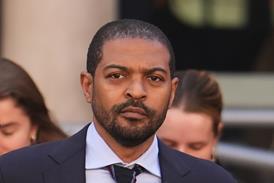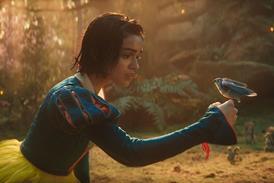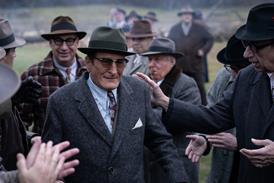A trio of leading US screenwriters debate the status of the writer in US productions, how much influence writers can wield over specific projects and how to deal with notes. Jeremy Kay leads the discussion
What is the writer’s influence on a project today?
Scott Burns: There’s a huge difference between a project you’ve brought to the studio or a financier and a thing you’ve signed on to write. If it’s your thing, then you have at least for a little while a lot of say what it’s about. That’s much different than if you’re signing on to a franchise or something they’ve decided to bring to the marketplace. I’ve had the good fortune of working with Steven Soderbergh and he’s very collaborative.
Dustin Lance Black: TV is where I started [on Big Love] and there it’s very collaborative and the writers have to be on set the whole time. So I charged into features with a head of steam not knowing things were so different and thankfully ended up on my first outing with Gus [van Sant on Milk], who was incredibly collaborative.
Was the process of working on Milk different to what you’re experiencing on J Edgar?
DLB: [Milk] was a spec script, so that was a very different experience to what we’re doing with J Edgar now. [J Edgar] was an idea I came up with the folks over at Imagine, [and] we brought [it] to a studio and it was kind of our baby. We took it to Clint [Eastwood] and he’s been incredibly curious about getting all the background details. On biopics at a certain point the script gets locked down out of necessity because you’ve got to employ an army to recreate these things. Then the writer becomes the historian and it’s wonderful in that way because you’re incredibly involved and you’re working with all the actors trying to bring them up to speed.
SB: I had the same experience with The Informant!, which in a sense is a biopic though it’s a pretty subjective biopic. Matt Damon and Steven wanted me there every second of every day because I was the historian and the keeper of the story. Steven would say it freed him up to deal with the concerns of any given day knowing that behind him was someone able to keep a longer view and prevent it veering off course. On The Bourne Ultimatum, I was just Jason Bourne’s step-parent for a while. I didn’t invent Jason Bourne but I was a huge fan of those movies and I like working with Matt and I like working with Paul [Greengrass], but I was much less important. So much less important that they could replace me. And they did!
There can be many writers on franchise films. How do the politics of rewrites play out?
SB: I wasn’t the first writer [on the Bourne films] — it was something Tony [Gilroy] had started and that Paul had worked on during the second movie. Though I hope I brought some of my interpretation of who that character was and how he should change, it’s different from something like Contagion, which I wrote as a spec script, or The Informant!, which was a thing I found and sold.
DLB: I’ve been threatened to be rewritten and it’s quite motivating. In terms of doing rewrites, I’ve been offered what was clearly someone’s passion project and by writers who I respected and I just turned them down. I just thought this isn’t the sort of business I want to get into.
SB: On the Bourne movie, I knew Tony through Steven Soderbergh and I called Tony and got his feelings and his background on the project, and to a large degree his permission. Tony had rewritten me a few years earlier on a project at Paramount and we’d had the same conversation. On Bourne the writer I followed was Tom Stoppard, and I found it absurd that I’d been hired to write after Tom Stoppard.
JC, Margin Call was a dream start. How do you follow that?
JC Chandor: The summer after we wrapped principal photography, I needed a job to support two children and then I had this entirely different scenario, which was an existing idea at a studio and my take on it got purchased but I was very clearly an employee [of Appian Way]. If it’s not a spec script it becomes very much who the executives are, what company you’re working with and what their goals are. I’ve just finished something I’m going to direct again.
Who gives notes to writers and what is a note really about?
DLB: I’ve got three studio things at various stages and for the most part they try to speak with a single voice, the development executives. I also reach out to my little core of people I take my stuff to and I get notes from them which are valuable and help me oftentimes interpret the notes I’m getting from a studio.
SB: A lot of times you have to find the note behind the note. There’s a movie I wrote and directed for HBO [Pu-239] and there were notes I got from an actor in the movie and it was that actor’s agenda to make a scene easier for them to play, but that wasn’t going to be good for the movie and so you have a different response to that. Other times you get notes from studios which are completely based on fear and you have to listen to those and not damage your movie in an attempt to make someone feel safer.
JCC: You have to go back and look at power structures for the executives giving the notes. What are they hearing that day? They’ve got jobs that are pretty tenuous, so what’s making them try to steer you towards something?
Is independent film-making an attractive option?
SB: In a sense you’re just switching at what end you encounter a certain set of problems. But the same thing could happen at a studio. You make a movie you love but the studio gets uncomfortable with it and so someone decides it should come out in a different year, or p&a all of a sudden isn’t what you thought it would be. You’re always going to be vulnerable.
Do writers have more strength now after the writers’ strike?
DLB: We have to keep a very close eye on residuals because what we’re getting residuals from is changing so rapidly now. Who wants residuals from DVDs any more?
SB: I spent a lot of time marching around in a circle at Fox, because I felt there’s so much bad shit News Corp does in the world, I’d be happy to picket them any day — News Corp, not the studio. I don’t sense my experience of being a writer has changed much since the strike. It feels like it was a bad thing for the business that a lot of people were hurt by. We need a much larger approach. It needs to be the DGA and SAG and the studios and the agencies working together. Most of the people I’ve spoken to, even in positions of leadership, say if we’re going to really take care of this business, which is a great thing for this country and is one of our leading exports, then we all have to be stewards of it and we’re all going to have to work together.
The writers
Dustin Lance Black
Won the original screenplay Oscar for Milk in 2009. He wrote and directed What’s Wrong With Virginia, starring Jennifer Connelly, and wrote J Edgar, a biopic on the FBI director Hoover, directed by Clint Eastwood and starring Leonardo DiCaprio, now in production.
Scott Burns
Wrote The Bourne Ultimatum and The Informant! among others, and produced the Oscar-winning documentary An Inconvenient Truth. He wrote the thriller Contagion, shot by Steven Soderbergh, and is preparing 20,000 Leagues Under The Sea: Captain Nemo for David Fincher.
JC Chandor
Wrote and directed the indie financial crisis drama Margin Call, which was acquired for North American distribution by Lionsgate and Roadside Attractions. He has a two-film writing deal with DiCaprio’s Appian Way and is lining up his second independent feature.
































No comments yet